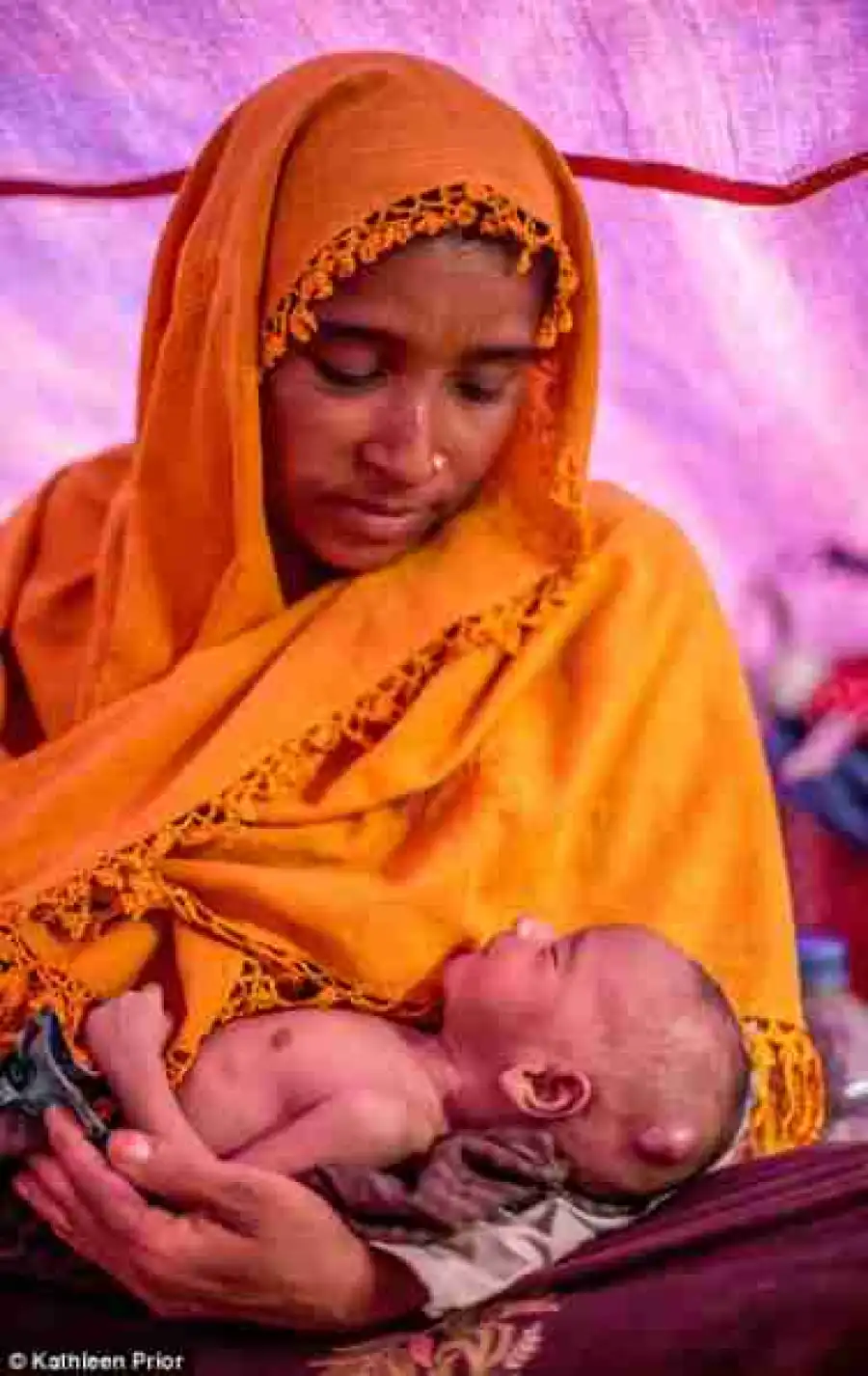Horror: This Woman Was Forced to Run for Her Life Just Moments After Giving Birth as Gunmen Invaded Her Village (Photos)

Horror: This Woman Was Forced to Run for Her Life Just Moments After Giving Birth as Gunmen Invaded Her Village (Photos)
A woman has been forced to run for her dear life just moments after giving birth as gunmen invaded her village to cause chaos.
A persecuted Rohingya woman has told how she was forced to run from Myanmar's military moments after giving birth and before her baby's umbilical cord had even been cut.
Hamida, 30, said her village of Quachong, Maungdaw, in Rakhine State was attacked on September 2. She was at home, full-term in her pregnancy, when she heard a commotion outside, followed by the sound of explosions.
Her face was expressionless as she recounted: 'The mob invaded our village, they fired at us with rocket launchers and chased us and even shot us as we were running away. Then they set fire to the village and it burned to the ground.'
With her baby due any day, Hamida was forced to flee to the forest with her husband and their six other children where they hid.
For 48 hours, they stayed in the forest. Then Hamida felt the first pangs of labour. Terrified, she realised her baby was coming but she had nothing, not even a blanket, and was forced to lay down on the forest floor.
The labour was quick, and three hours later she delivered a healthy baby boy. But suddenly, before Hamida had a chance to recover, she heard noises in the forest. Fearing it was the military, the family had to move or risk being found.
Before the umbilical cord had even been cut, Hamida was forced to flee.
'I ran with the baby still attached. They were chasing us, and I knew they had guns and knives,' Hamida said. 'I was in agony, but what could I do? If they catch us, they kill us, and my newborn baby.'
She does not know how long she ran. Blinded by panic and searing pain she clutched her newborn and prayed she would take him out of harm's way.
When the family were finally able to rest again, Hamida's husband cut down two pieces of bamboo and used this to sharpen the blade of his old machete. With this, he cut the umbilical cord.
Hamida spent three more days in the forest recovering from the birth. There, she and her husband named the baby, Hossain Shaheb. With little food to be scavenged and no drinking water, the family had to make their way to Bangladesh.
Hamida said: 'We just slept on the ground under the open sky, and we had no food to eat. We went days where all we found was water. The other kids were crying hysterically from hunger.'

The family walked for another two days to reach the Naf River, the border with Bangladesh. There, a boatman took pity on the family and brought them across for free. He offered his home to them and gave them the first meal they had eaten in days. They stayed for two nights.
After the short stop, the family headed to the informal refugee settlement in Gumdum, where 50,000 refugees had temporarily resided. Hamida's husband bought some bamboo and a tarpaulin to build a shelter, and with the cooking pots and blankets gifted by the kind-hearted boatman, the family tried to make a home.
'We don't want to be here, we have no happiness here,' Hamida said, her voice cracking with emotion. She looked down tenderly at her 15-day-old son. 'But we had to leave, or we would have been killed.'
Sat under plastic sheeting that had been fashioned into a makeshift shelter, little Hossain whimpered in her arms, too feeble to cry.
'He's hungry,' said Hamida, looking down at him helplessly, 'But what can I do? I have no milk.' She had barely eaten in days, and as her body grew weak, she was no longer lactating.
Her other children pawed at her, asking for food, but she had nothing to give them. Her husband had gone to find an aid distribution and pick up supplies of food and drinking water. But Hamida knew there was not enough for everyone, and expected she would go to sleep hungry once again.
Hamida is one of 422,000 Rohingya refugees who have fled violence in Myanmar since August 25.
There have been clashes between different ethnic groups in the Rakhine state of Myanmar for decades. The Rohingya people, of which there were an estimated 1.1 million living in Rakhine, are denied citizenship, as it is argued they are not Myanmar nationals but descendants of Bengali immigrants. The Rohingya people claim they have lived on the land for hundreds of years, and that their parents and grandparents were born there.
Tensions escalated, and on the August 25, a group of Rohingya extremists carried out a series of attacks on police checkpoints, killing around a dozen people. In response, the Myanmar government initiated a military crackdown to deal with the 'terrorists'.
The events that have unfurled since were declared a 'textbook example of ethnic cleansing' by United Nations human rights chief, Zeid Ra'ad Al Hussein. The Bangladesh Prime Minister, Sheikh Hasina, who visited the camps to meet with refugees accused Myanmar of 'genocide'.

{{comment.anon_name ?? comment.full_name}}
{{timeAgo(comment.date_added)}}
{{comment.body}}
{{subComment.anon_name ?? subComment.full_name}}
{{timeAgo(subComment.date_added)}}
{{subComment.body}}